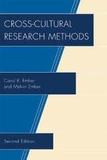During most of human history--99%-- humans lived in small hunting bands and tribal farming villages. About 5,000 years ago, a revolution began. This course is about that revolution.
Specifically, we will investigate the:
You will use the online Human Relations Area Files (eHRAF) and cross-cultural comparative methods to conduct original, data driven, analyses to gain insights about the past. The course is a blend of anthropological and archaeological approaches to understanding the past and human behavior. It is not a world (pre)history course; rather, we will consider questions about why/how prehistory and human social evolution proceeded the way it did. Students are active participants in the process of knowledge creation in this course. Understanding how we know what we know about the past is continual theme throughout the course.
This course is open to students in any major; no prerequisites are required. Non-anthropologists/archaeologists may, however, need to do some individual reading to understand some archaeological methods.
Specifically, we will investigate the:
- transformation of early hunters and gatherers to "modern" humans living in the first cities
- factors that influenced the rise, development, and collapse of early cities and civilizations around the world
- origins of agriculture
- concept of sociocultural evolution
- rise of civilization in Mesopotamia, the Mediterranean, Egypt, the Indus Valley, Northern China, Mesoamerica, and the Andes.
You will use the online Human Relations Area Files (eHRAF) and cross-cultural comparative methods to conduct original, data driven, analyses to gain insights about the past. The course is a blend of anthropological and archaeological approaches to understanding the past and human behavior. It is not a world (pre)history course; rather, we will consider questions about why/how prehistory and human social evolution proceeded the way it did. Students are active participants in the process of knowledge creation in this course. Understanding how we know what we know about the past is continual theme throughout the course.
This course is open to students in any major; no prerequisites are required. Non-anthropologists/archaeologists may, however, need to do some individual reading to understand some archaeological methods.
Textbook
I am selecting the most interesting and relevant readings from a variety of sources to support our learning. Readings will be posted on this website (see "Readings" tab) and on Blackboard.
Some representative readings (select chapters) include:
Understanding Early Civilizations: A Comparative Study by Bruce Trigger
Why the West Rules, For Now by Ian Morris
The Measure of Civilization, by Ian Morris
Guns, Germs, and Steel, by Jared Diamond
The Cultural Evolution of Civilizations by Kent Flannery
The Comparative Archaeology of Complex Societies, Edited by Michael E. Smith
Some representative readings (select chapters) include:
Understanding Early Civilizations: A Comparative Study by Bruce Trigger
Why the West Rules, For Now by Ian Morris
The Measure of Civilization, by Ian Morris
Guns, Germs, and Steel, by Jared Diamond
The Cultural Evolution of Civilizations by Kent Flannery
The Comparative Archaeology of Complex Societies, Edited by Michael E. Smith

